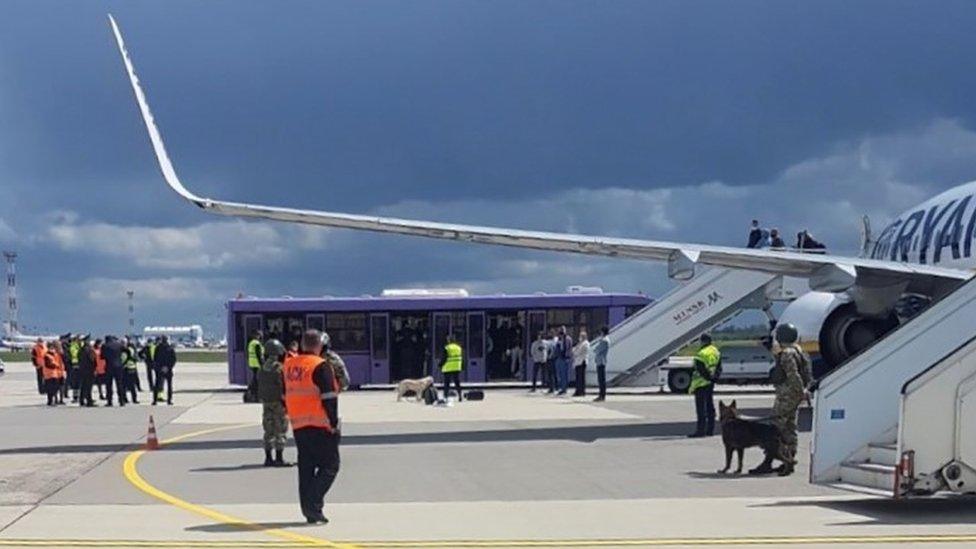Belarus plane: What we know and what we don't
- Published
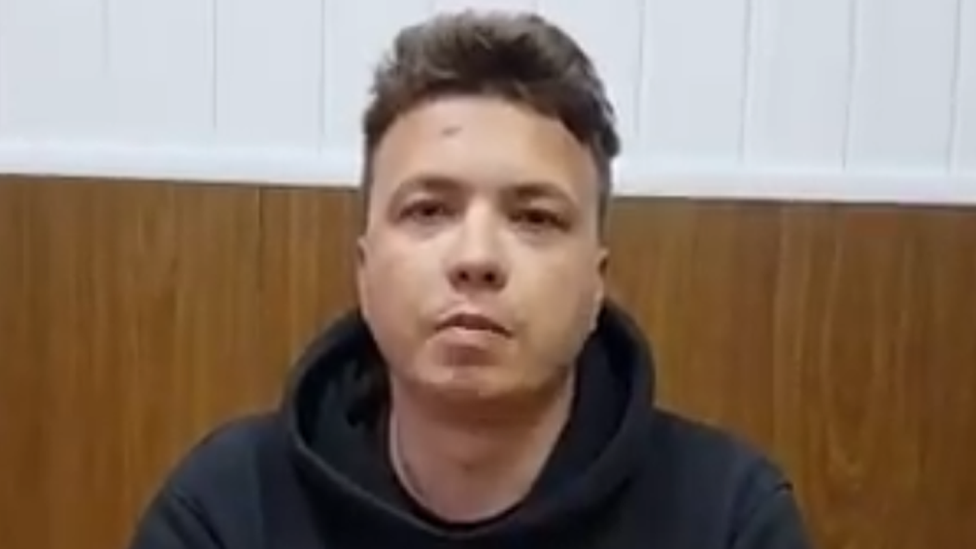
A video of Roman Protasevich appearing to confess to crimes was released by Belarus authorities late on Monday
International anger has grown over the detention of an opposition Belarusian journalist and his girlfriend, after the Ryanair plane they were travelling on was forced to land in the country.
Here's what we know so far about the arrest of Roman Protasevich and Sofia Sapega.
Why did the plane land in Belarus?
Ryanair flight FR4978 was travelling from the Greek capital, Athens, to Vilnius in Lithuania on Sunday 23 May when it made an abrupt change of course over Belarus, some 10km (six miles) from the Lithuanian border.
According to an unverified transcript from the Belarusian transport ministry, air traffic controllers told the pilot at 09:30 GMT "you have [a] bomb on board and it can be activated over Vilnius". Even though the plane was closer to Vilnius than Minsk, the pilot was told to divert to the Belarusian capital. At 09:47 the pilot declared an emergency.
An earlier transcript broadcast by Belarus TV made it look as though the crew had asked to land in Minsk.
A Belarusian MiG-29 jet was scrambled to escort the plane, which landed at 10:16 GMT (13:16 local time).
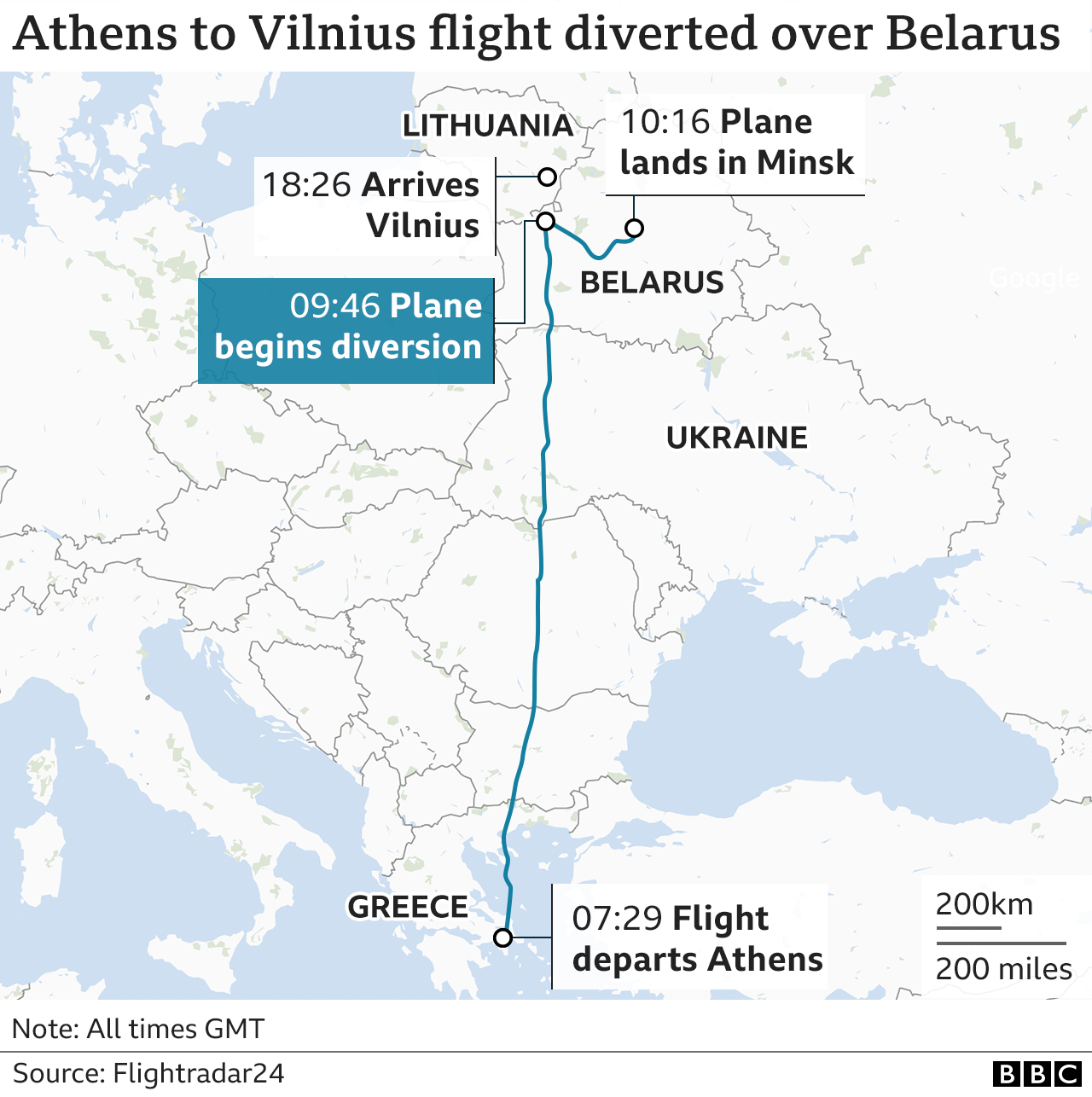

Leading opposition figure Pavel Latushko alleged Belarus had threatened to shoot down the plane, but that has not been verified.
Was there a bomb threat?
Belarus has claimed the flight was diverted because of an emailed bomb threat from Hamas, but the Palestinian militant group denies any involvement.
Belarus President Alexander Lukashenko told parliament the email originated in Switzerland. However, Swiss authorities say they know nothing about it, and the Swiss email provider Proton Technologies said it had not seen "credible evidence that the Belarusian claims are true".
It confirmed reports that the email was sent 24 minutes after Belarus ordered the plane to divert.
German Chancellor Angela Merkel described the Belarusian claim as "completely implausible". Ryanair Chief Executive Michael O'Leary, meanwhile, described the Belarusian move as "a case of state-sponsored hijacking".
Speaking to a UK parliamentary committee on 15 June, Mr O'Leary said the crew had been told there was "a credible threat that if the aircraft entered Lithuanian air space, or attempted to land at Vilnius airport, that a bomb on board would be detonated".
The captain "repeatedly" requested to speak to Ryanair's operations control centre in Poland, but was told by Minsk Air Traffic Control that they were not answering - something Mr O'Leary said was untrue.
He said that flights in the area would normally be diverted to Poland, but the gravity of the situation outlined by authorities in Minsk gave the pilot "no alternative" but to land in Belarus.
What happened to the passengers?
As the plane landed witnesses said Roman Protasevich was "super scared", and one quoted him as saying "I'll get the death penalty here". He had been charged in absentia with inciting mass protests, but Belarus's KGB security agency also placed him on a list of "individuals involved in terrorist activity".
When the plane's 126 passengers disembarked, police arrested Mr Protasevich and Sofia Sapega, a Russian citizen studying in Lithuania. Three other passengers were listed as remaining in Minsk.
The other passengers were allowed on to the plane, which flew on to Vilnius around seven hours later.
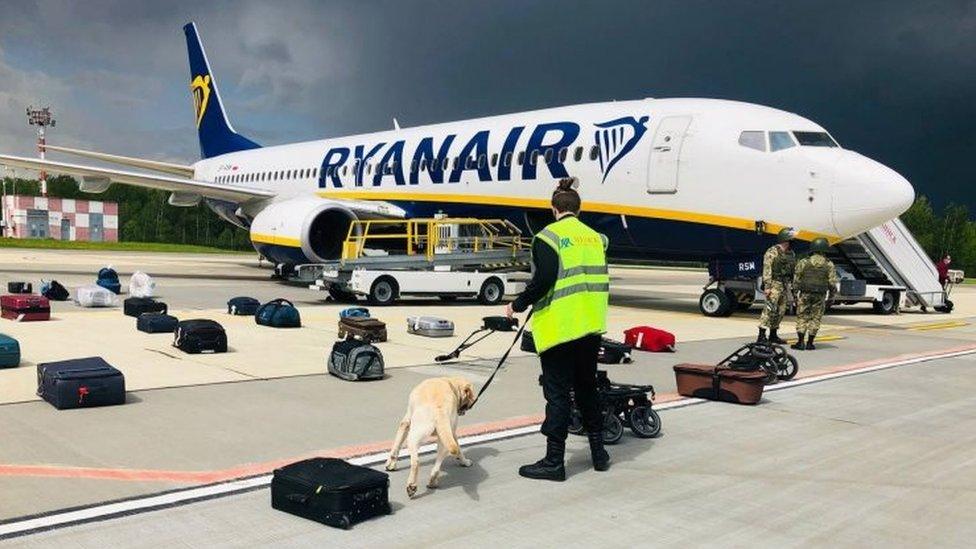
Further details have emerged of the passengers who did not get back on board in Minsk
The three other passengers who remained were named by Belarus state media and in Greek reports. Iason Zisis, said to be a doctoral researcher at Eindhoven University, told Belarus 1TV he was visiting his wife in Minsk so it made sense to disembark. Belarus TV named another passenger, Alexandra Stabredova, who said she asked to stay in Minsk. Sergei Kulakov said his final destination was the city of Vitebsk in northern Belarus.
Ryanair Chief Executive Michael O'Leary told British MPs that he understood from security agencies that the three individuals who disembarked were "KGB types".
What has Lukashenko said?
Belarus's long-time leader said three days later: "I had to protect people. I was thinking about the country's security."
He also accused domestic and foreign "ill-wishers" of using the incident to attack the country. "They have crossed many red lines and have abandoned common sense and human morals," he said.
Russian President Vladimir Putin - Mr Lukashenko's strongest political ally - has continued to support him.
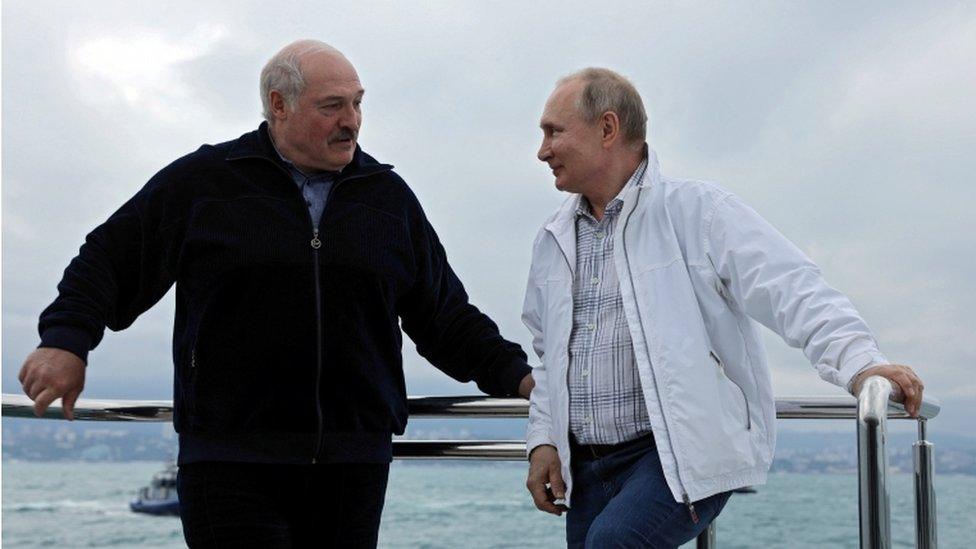
Russia's President Putin dismissed Western outrage over the plane's diversion
The two men met at the Black Sea resort of Sochi days after the flight diversion, with President Putin later confirming that Russia would move ahead with a second $500m (£352m) loan to Belarus in June. The full $1.5bn loan was initially agreed at a meeting last September.
What do we know about Protasevich and his girlfriend?
The couple were returning from Greece. Mr Protasevich had taken part in a conference involving Belarusian dissidents in Athens before they spent some time on holiday, reportedly in Crete.
Mr Protasevich is a former editor of Nexta, a dissident media operation with a popular Telegram messenger channel. He left Belarus in 2019 and has been living in exile in Lithuania. Nexta became a significant channel for protesters challenging the August 2020 presidential election in Belarus, widely condemned as rigged.
Roman Protasevich's father tells the BBC he is fearful his son may be tortured
In a video clip released the following day, Mr Protasevich said he was in good health and appeared to confess to crimes he had been charged with by the Belarusian state. He has since appeared several times on Belarus state TV.
His family and human rights groups are convinced his words were spoken under duress. In a 90-minute interview broadcast on 3 June he burst into tears and put his hands to his face. Marks were visible on his wrists and his father Dmitry said the video was the result of "abuse, torture and threats".
Sofia Sapega has been studying for final law exams at the European Humanities University in Vilnius. Although Russian-born, she has spent most of her life in Belarus, a fellow student said. She too was shown in a video apparently reading under duress from a prepared statement in which she speaks of editing a Telegram channel that publishes the personal information of Belarusian policemen.
Her mother Anna Dudich told the BBC her daughter was not an activist. She said she believed her daughter was arrested because of her relationship with Mr Protasevich.

Russian embassy officials who visited her in custody said she was in good health and had not complained about her treatment.
Ms Sapega's university has protested over the Belarusian authorities' actions.
On 25 June, it was revealed that the pair had been placed under house arrest. Ms Sapega in a flat on her own in Minsk and Mr Protasevich at an undisclosed location, allegedly under secret police supervision.
What penalty does Protasevich face?
Mr Protasevich faces charges of organising mass unrest after covering the events of the 2020 presidential election from abroad. The offence carries a possible jail term of up to 15 years. However, Mr Protasevich tweeted a KGB list of terrorism suspects last year, external, adding that he had been placed on it alongside Islamic State jihadists.
Terror offences reportedly carry the death penalty in Belarus.
Opposition figures and independent journalists have been arrested in large numbers in Belarus in recent months. Human rights group Viasna reports that 472 people are being held as political prisoners, external.
On 1 June alone, Belarus sentenced seven activists - including senior opposition figure Pavel Severinets - to between four and seven years for their part in last year's protests.
Another political activist jailed over the unrest, 50-year-old Vitold Ashurok, died of cardiac arrest at a penal colony in the east of the country on 20 May. Authorities released a shocking video of Ashurok twice collapsing in his cell.
How has the international community reacted?
The European Union has barred Belarusian airlines from flying over or landing in all 27 member states. Airlines have also been asked to avoid Belarusian air space. The UK and Ukraine have reacted similarly.
The EU has also imposed sanctions on 78 individuals, some of whom were linked to the "forced and unlawful landing" of the Ryanair plane, and on the Belarusian economy, focusing on key sectors including tobacco, petroleum and potash fertiliser.
Ryanair's initial reaction was clumsy, external, announcing that the plane was able to fly on to Vilnius but failing to mention that two of its passengers had been arrested. The next day the airline condemned an act of "aviation piracy".

Behind Belarusian 'far-right mercenary' claims
Analysis by Alistair Coleman, BBC Monitoring Disinformation Specialist
The pro-Lukashenko press in Belarus has portrayed the dissident journalist as an extremist with right-wing sympathies.
Belarus Segodnya, a newspaper published by the presidential administration, claimed that Mr Protasevich was a mercenary who fought in eastern Ukraine in 2015 with the ultra-nationalist Azov Battalion.
Images have emerged which show a man who resembles Mr Protasevich in army fatigues and holding weapons, including one on the front cover of an Azov Battalion magazine from 2015. Some of these were leaked by a pro-Lukashenko Telegram channel and then aired on state TV as "proof" of Mr Protasevich's military involvement in the conflict.
Mr Protasevich confirmed in an interview last year that he had spent a year in the conflict-hit Donbas region and was wounded, but said he was covering the conflict as a journalist and photographer. A former commander of the Azov unit has backed his version of events.
But details from 2015 interviews with an Azov fighter using the pseudonym "Kim" closely correlate with Mr Protasevich and a photograph identifying "Kim" is identical to the one state media says shows Mr Protasevich was there as a militant.
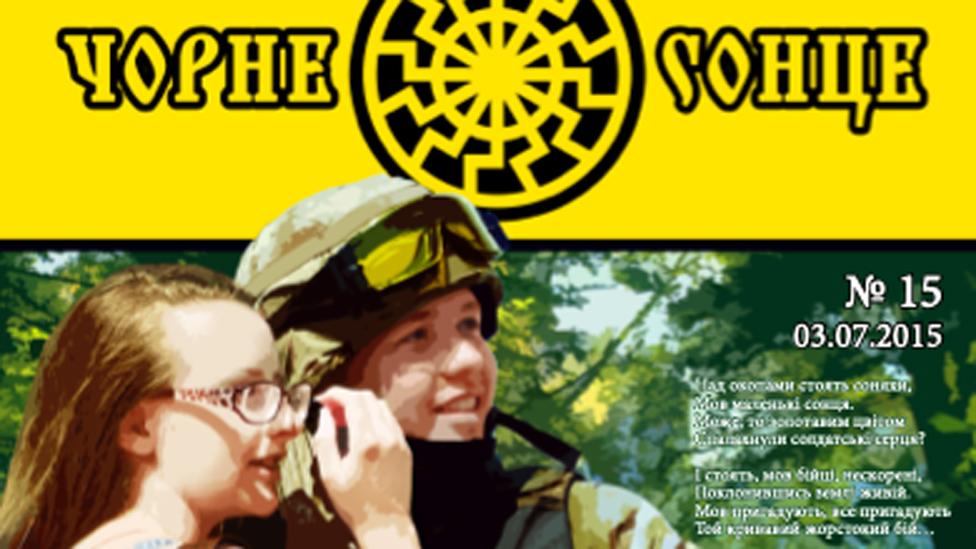
The evidence appears to show that "Kim" and Roman Protasevich are the same man, although the question of whether this person was engaged in active combat, as alleged by the Belarusian authorities, is still disputed and has not been independently confirmed either way.

- Published25 May 2021
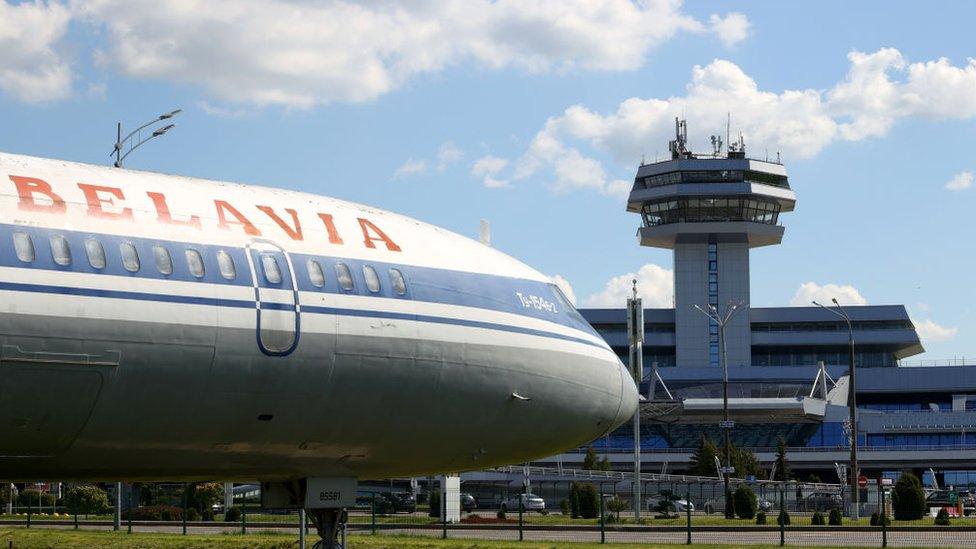
- Published25 May 2021
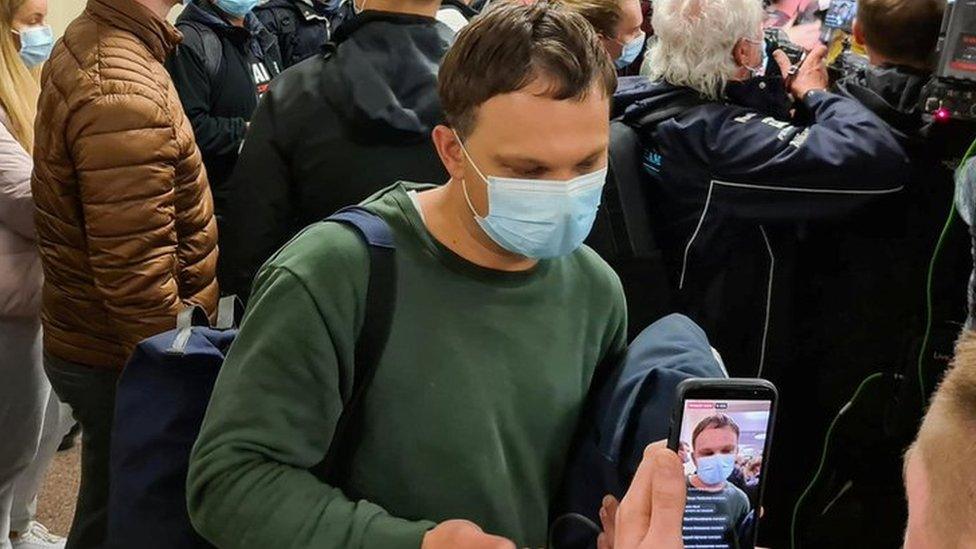
- Published25 June 2021
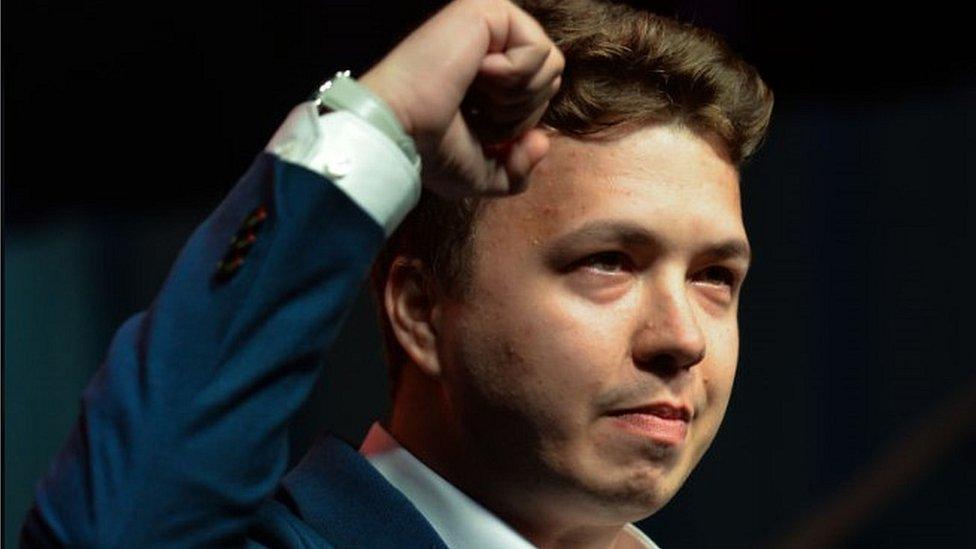
- Published21 June 2021
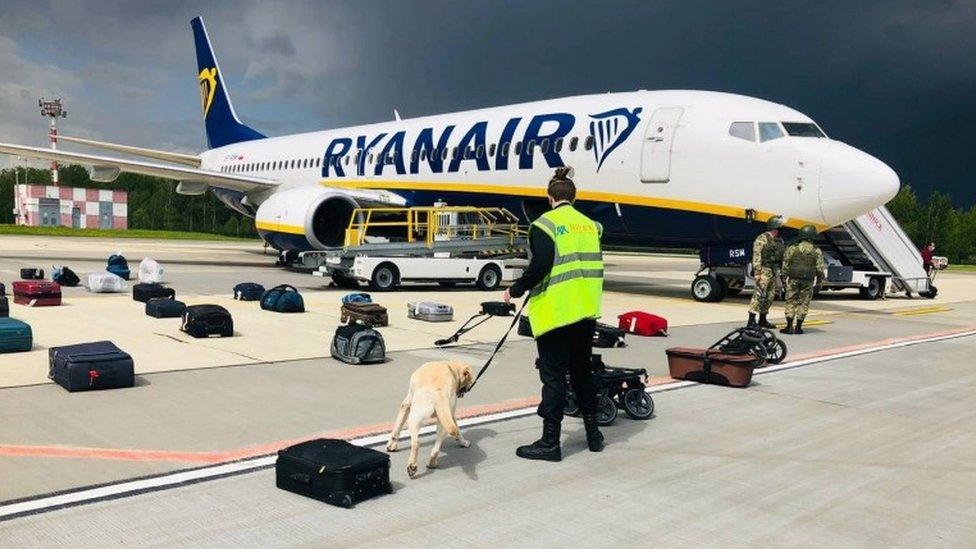
- Published25 May 2021
